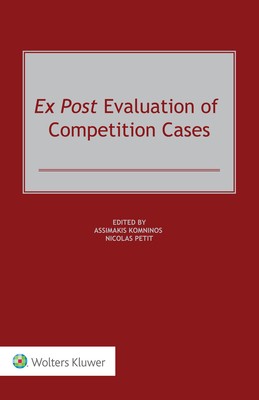
- We will send in 10–14 business days.
- Publisher: Kluwer Law International
- ISBN-10: 9403537302
- ISBN-13: 9789403537306
- Format: 15.6 x 23.4 x 1.8 cm, kieti viršeliai
- Language: English
- SAVE -10% with code: EXTRA
Ex Post Evaluation of Competition Cases (e-book) (used book) | bookbook.eu
Reviews
Description
Competition authorities use ex post evaluation of enforcement decisions to help determine if an intervention (or non-intervention) has achieved its objectives - and, if not, the reasons it failed to do so - thus allowing for improvement in the design and use of techniques used in the analysis underpinning the decision. In this essential volume, expert contributors use this procedure to provide a neutral and extensive assessment of cases that have significantly shaped European Union (EU) competition law enforcement.
With in-depth analysis of foundational cases of EU competition law and the methodologies that have been developed over time to predict how enforcement decisions will affect competition, for each case the authors respond thoroughly to such questions as the following:
- Did the decision have an impact on the affected market?
- Did it improve consumer or social welfare?
- With the benefit of hindsight, were the factual assertions true?
- Were all the relevant theories of harm (and efficiency justifications) properly investigated?
- Was the decision able to deter similar anticompetitive behaviour?
- Did the decision provide clear guidance on which types of conduct should be deemed illegal?
Industries covered include information technology (the Microsoft cases), payment cards (the Visa Europe 2010 Commitments Decision), pharmaceuticals, and conditional rebates (Michelin I, Michelin II and BA/Virgin). Also investigated are the role of buyer power in concentration cases and the relative strength of competition law enforcement versus regulation, where appropriate.
In its accumulation of evidence from individual cases that have gradually improved our ability to grasp the connections between policy choices and the outcomes they lead to, this matchless volume has no peers. It constitutes an invaluable resource for competition authorities in performing ex post evaluations and will be welcomed by practitioners and academics concerned with European competition law.
EXTRA 10 % discount with code: EXTRA
The promotion ends in 22d.06:43:37
The discount code is valid when purchasing from 10 €. Discounts do not stack.
- Publisher: Kluwer Law International
- ISBN-10: 9403537302
- ISBN-13: 9789403537306
- Format: 15.6 x 23.4 x 1.8 cm, kieti viršeliai
- Language: English English
Competition authorities use ex post evaluation of enforcement decisions to help determine if an intervention (or non-intervention) has achieved its objectives - and, if not, the reasons it failed to do so - thus allowing for improvement in the design and use of techniques used in the analysis underpinning the decision. In this essential volume, expert contributors use this procedure to provide a neutral and extensive assessment of cases that have significantly shaped European Union (EU) competition law enforcement.
With in-depth analysis of foundational cases of EU competition law and the methodologies that have been developed over time to predict how enforcement decisions will affect competition, for each case the authors respond thoroughly to such questions as the following:
- Did the decision have an impact on the affected market?
- Did it improve consumer or social welfare?
- With the benefit of hindsight, were the factual assertions true?
- Were all the relevant theories of harm (and efficiency justifications) properly investigated?
- Was the decision able to deter similar anticompetitive behaviour?
- Did the decision provide clear guidance on which types of conduct should be deemed illegal?
Industries covered include information technology (the Microsoft cases), payment cards (the Visa Europe 2010 Commitments Decision), pharmaceuticals, and conditional rebates (Michelin I, Michelin II and BA/Virgin). Also investigated are the role of buyer power in concentration cases and the relative strength of competition law enforcement versus regulation, where appropriate.
In its accumulation of evidence from individual cases that have gradually improved our ability to grasp the connections between policy choices and the outcomes they lead to, this matchless volume has no peers. It constitutes an invaluable resource for competition authorities in performing ex post evaluations and will be welcomed by practitioners and academics concerned with European competition law.


Reviews